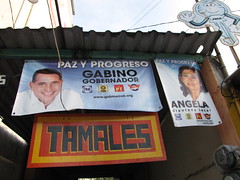
This is an expanded explanation of electoral vices such as vote buying and coercion that I wrote about in a recent Canwest News Service story. (Story link in title.)
The 10th anniversary of the Vicente Fox's historic toppling of the Institutional Revolutionary Party passed on July 2. Two days after that, 12 states hold gubernatorial elections widely expected to result in a PRI landslide.
Much of Fox's and the National Action Party's original agenda of change has gone unfulfilled - and toppling the PRI remains the most remarkable accomplishment. Even less of their agenda of change happened on the state level, where governors now preside over fiefdoms lacking much in the way of transparency - or even impartial electoral institutions.
The lead-up to the July 4 elections have highlighted the lack of change - and also exposed many of the lingering electoral vices that have been hard to break such as vote buying and coercion. These vices have been rife of late, not just been confined to the PRI campaign, and, according to some observers, become more rampant.
Jeffrey Weldon, director of the political science department at ITAM, attributes a large part of the problem to the electoral reforms of 2007, which gave the parties free radio and television advertising and barred political messages from non-political players from the airwaves.
Parties used to spend hundreds of millions of pesos on electronic advertising, but now have extra cash since such ads are now distributed to the parties for free based on a formula that takes into account their previous electoral performances. The extra money now is spent on the "ground game," Weldon says.
"The advantage of the previous system is that everyone had to spend their money on TV, which is all open. Everyone sees what your doing and they didn’t have much money left over to spend on the ground game. It’s the ground game where there’s a lot of fraud,” he explains.
“These things are a lot worse than they used to be and they’ve learned new tricks that they didn’t have to use before.”
Much of the criticism for the vices focuses on state governors, who became powerful over the the past decade and, in many places, effectively run the campaigns of their preferred successors.
Tapes also surfaces in places such as Veracruz and Oaxaca purporting to show two PRI governors, Fidel Herrera and Ulises Ruiz, scheming to win votes for the PRI gubernatorial campaigns and, in the case of the two-time lottery winner Herrera, using government social programs for political ends.
The PRI has countered that the federal government operates social programs such as Oportunidades (a conditional cash transfer program for the poorest Mexican families) with electoral aims and has branded the Social Development Secretariat (Sedesol), "The electoral arm of the PAN." PRI Senate leader Manlio Fabio Beltrones long has pushed for Sedesol to be dissolved and its duties - such as giving cash to Oportunidades recipients - be sent to the state level, where the PRI controls more than half of the governments.
Weldon points out, however, "The federal government doesn’t have money to do vote buying," and that the governors "have taken control of the giving away process."
NO PRI MONOPOLY
Many political observers point out that governors from other parties regularly engage in such vices as vote buying and coercion, too.
"What the PAN denounces in Oaxaca the PAN does in Tlaxcala ... and the PRD does in Mexico City," says Aldo Muñoz Armenta, political science professor of the Autonomous University of the State of Mexico.
In Tlaxcala, the PAN leadership has given governor Hector Ruiz free rein to run the party's gubernatorial campaign - which the PAN could win, a possible lesson for a party rife with dissension over the Felipe Calderon-loyal central leadership's eagerness to meddle in local matters. Ruiz has been accused of putting government resources toward the PAN campaign. (Look to Aguascalientes, where the PAN is poised to lose, along with San Luis Potosí, Mazatlán and Mérida for examples of national party meddling leading to electoral disasters.)
In Zacatecas, where the left-wing Democratic Revolution Party (PRD) is unravelling and expected to lose the governorship to the PRI, the magazine Proceso reported on a video showing state employees plying farmers with cheques and pre-election giveaways.
Other factors may also be at work, including structural differences between federal and state politics and governors now having more money to give away - presumably for legitimate public works.
"There’s an enormous amount of pork being delivered, (more than) in the past," says Federico Estévez, political science professor at ITAM. "There’s a lot of vote-buying out there, but there’s also a lot of public works."
And on the state level, he points out that many governors have the luxury of depending on legislatures split between just two parties as very few states - with the possible exceptions of Michoacan, Tlaxcala, Morelos and Chiapas - feature anything other than two-party political systems. (Mexico City might be the oddest since it's perhaps the only place in the country with PRD-PAN battles as opposed to the usually PRI-PRD or PRI-PAN showdowns. The 2006 federal race between a strong PAN and a strong PRD could be a historical aberration.)
"Governors are taking advantage of their electoral arithmetic," he says. "You don't have much blocking in the states."
Ultimately, Estévez says the problems have been in the democratic reforms, which operated on many false assumptions.
"The flaw isn’t with the governors. The flaw is with the political transition, the democratic reforms," he says.
"They always assumed that what happened at the national level would be replicated inevitably in local politics."


No comments:
Post a Comment